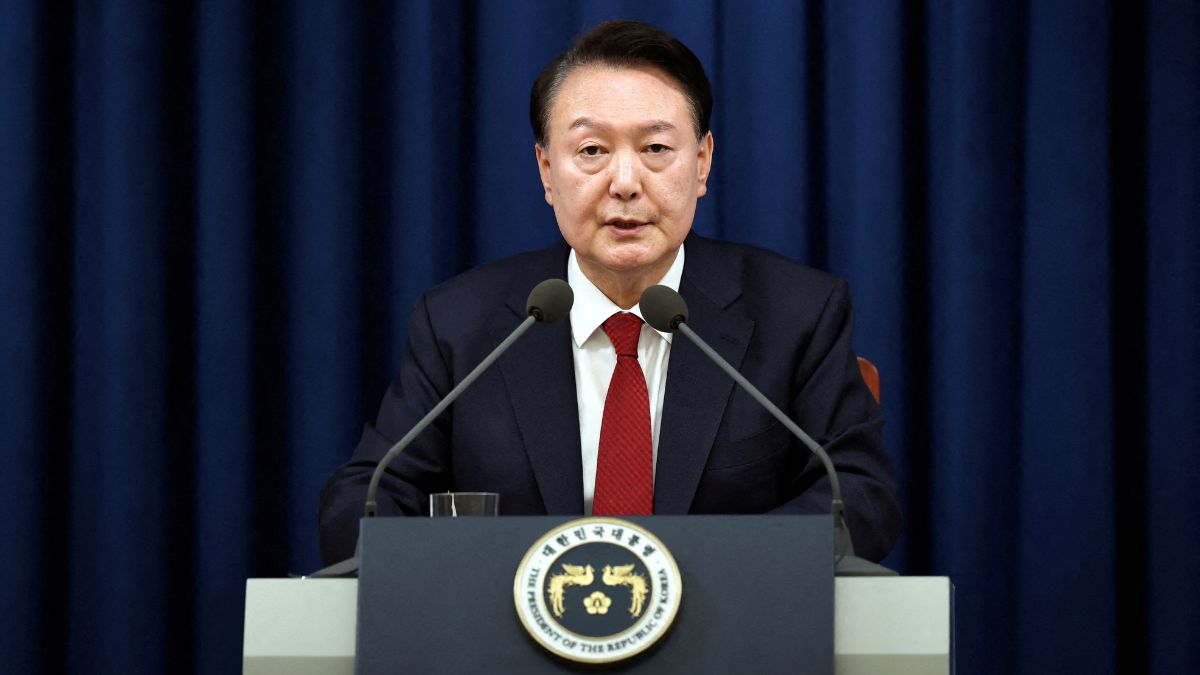South Korean President Yoon Suk-yeol is facing new allegations that he may have provoked Pyongyang to justify his controversial decision of declaring martial law in the country nearly a week ago.
According to a South China Morning Post report, Park Beom-kye, a senior politician from South Korea’s main opposition party, the Democratic Party of Korea (DPK), accused the country’s military of orchestrating a drone flight near the border with North Korea in October.
Park suggested the incident was part of a plot by Yoon to consolidate his power, added the report.
“It appears this was intended to create a pretext for imposing martial law,” South China Morning Post report quoted Park as saying, citing Yonhap News Agency.
Park also singled out Yeo In-hyung, the head of the military’s anti-espionage unit and a close ally of former defence minister Kim Yong-hyun, as a central figure in the alleged plot.
Both Kim and Yeo have been banned from leaving the country as authorities investigate their involvement in the failed coup attempt, added the report.
Kim resigned as defence minister last week following his role in Yoon’s brief declaration of martial law, which was quickly overturned by parliament. He was later placed under emergency arrest on charges of insurrection, while Yeo has been suspended from his duties.
Impact Shorts
More ShortsIn October, North Korea reported finding unmanned aerial vehicles near Pyongyang, accusing Seoul of sending them and warning of retaliation. South Korea’s Joint Chiefs of Staff (JCS) declined to comment, adhering to its policy of not confirming or denying drone infiltrations, reported South China Morning Post.
Park also claimed that Kim sought to provoke a military clash with North Korea, criticising army commanders for not firing warning shots at balloons launched from the North. These balloons, filled with trash, were sent into South Korea in retaliation for defectors and activists sending anti-regime leaflets into North Korea.
Local media had previously reported that JCS Chairman Kim Myung-soo had refused orders from Kim Yong-hyun to strike North Korean balloon launch sites. However, the JCS denied these reports, stating that no such orders were given, although discussions on how to respond to North Korea’s provocations did take place.
The defence ministry declined to comment on the allegations, added the report.
The unification ministry had previously said that North Korea was escalating tensions to rally support for its fragile regime and strengthen control over its population. The sudden “fuss” about supposed drones flown by Seoul targeting the North were designed for the same purpose, the report quoted ministry ass saying at that time.
On Monday, unification ministry spokesman Koo Byung-sam clarified that the ministry’s earlier remarks did not suggest the drone incident was “fabricated” by North Korea.
“We’ve said the North has a tendency to exaggerate external threats for its internal needs,” South China Morning Post quoted Koo as saying.
Military experts also questioned the drones’ origins.
Lee Il-woo, an analyst with the Korea Defence Network, said although the drones initially appeared to be South Korean military equipment, a closer examination revealed they were not.
“Their navigation routes and design suggest they were not military-grade drones,” Lee told South China Morning Post, adding that their trajectory – flying further north rather than returning south – was inconsistent with an alleged mission to distribute propaganda in Pyongyang.
“And we have to take into account the fact that opposition parties are revving up to impeach Yoon,” Lee added.
Another researcher at a government-funded think tank stated that more data was needed to assess the drones’ nature.
However, critics suggested that Yoon and Kim Yong-hyun may have exaggerated threats from Pyongyang to prime the public for the martial law declaration.
Yang Moo-jin, head of the University of North Korean Studies, argued that it was plausible the South Korean military could have staged the drone incident to justify imposing martial law.
“Historical precedents show such tactics have been used by authoritarian leaders in the past,” South China Morning Post quoted him as saying.
With inputs from agencies


)

)
)
)
)
)
)
)
)



